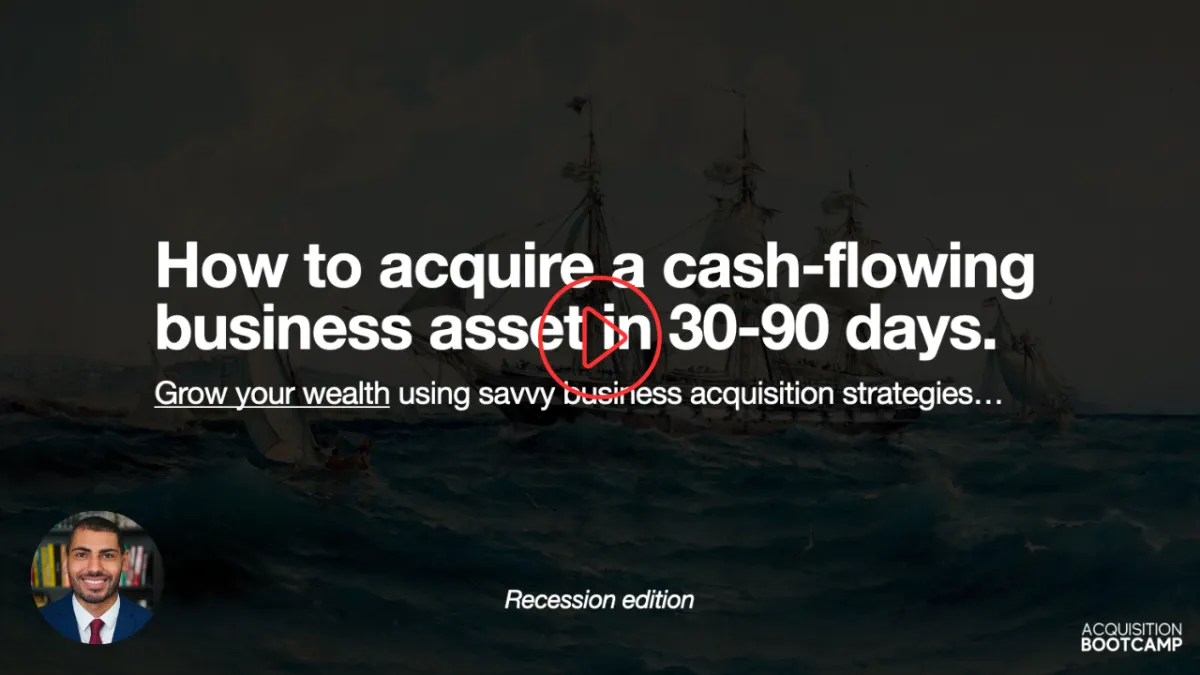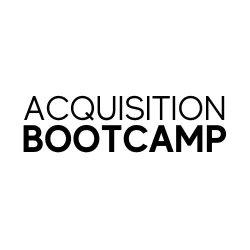
How to acquire a cash-flowing business asset within 30-90 days.
Grow generational wealth using creative win-win deal structures. Even during a recession.

Inside this on-demand video + playbook:
How to find businesses or assets in any industry that you can acquire using 1 of 7 creative deal structures.
The 4 types of businesses you should never touch (avoid like the plague)
The 6 types of scale. How to grow an acquired asset using one of these methods to create instant equity and ROI.
We protect your privacy.
More hard-earned secrets that will be revealed:

Proprietary Deal Flow
The exact 3 methods to generate off-market, proprietary deal flow that fits your exact criteria (automated)

Financing wizardry
Exactly how to use one or more of the 7 creative deal structures to finance your new acquisition, so you can cash flow on day 1 (win-win techniques that actually work in 2023)

Due diligence
The 37 questions to ask, to find the skeletons in the closet (ignore these at your own risk)

Risk minimisation
How to protect your downside risk with carefully crafted clauses.

Industry tailwinds
Exactly which industries have tailwinds right now, and which to avoid at all costs.

Recession workaround
How to acquire business assets during a recession (protect yourself during a downturn)

Scale & Leverage
How to create a plan to scale the growth of your new acquisition (choose from these 6 scale pathways)
We protect your privacy.
FAQ's
What kind of business can I acquire?
Every single business is started, and eventually will be handed over to someone else, or shut down. Therefore, any business that operates can be acquired successfully. It's generally an advantage to choose an industry and business that you have some level of experience in (however, this isn't always a must). There are 3 main types of businesses - service-based, physical product-based, digital product-based. We will cover the pro's and con's, and how to create a simple criteria you can use to start to look for opportunities.
If I have no experience, can I still buy a business asset?
This depends on many factors, but yes it is possible (although less favourable). There are several options like getting a partner, structuring the deal to include an industry expert on the board and other solutions we will touch on.
Do I need to have a lot of capital to acquire business assets?
If you don't have any capital, and are in financial stress, conducting a business acquisition is not wise, for many reasons. In saying that, it is certainly possible to not deploy your own capital into deals. This depends on how you structure the acquisition. There are 6 main methods we will cover in regards to this. Capital raising is a big sticking point for many searchers, however it's a hurdle that can be overcome. However, once again, even if you can strike a favourable low or no capital structure, it's still advisable to have a cushion to be able to support the business/asset depending on the situation.
I'm worried about a recession/down-turn. Is it possible to still get deals done?
The way you should structure an acquisition changes significantly during a recession or downturn. We will cover some clauses you should use, how to approach valuations, due diligence - and ultimately, how to protect yourself.
If I acquire a business/asset, how do I transition it and make sure it operates smoothly?
This depends on the situation, but contrary to popular assumption, the seller doesn't always need to leave, especially right away. In many cases, the seller can arrange a lengthy transition period. You of course have the option of operating the business yourself or hiring a manager (we will touch on how to model this in your due diligence).
How do I find owners?
There are 2 types of deal flow, on-market and off-market. We will cover both. Generating off-market deal flow depends on what kind of business asset you are looking for. If you want to buy an e-commerce brand, it is different from looking for a healthcare business. We will discuss several methods to automate this and have deals coming to you.
What's better, starting a business or acquiring one?
While we might be inclined to to say acquiring is always better, that's not true. This depends on who you are, your experience, and the type of business itself. One thing is fairly common - if you speak to most business owners who are successful, they will tell you it took a lot of hard work and time. That is the nature of start-ups. And since most start-ups fail, acquiring proven businesses that have stood the test of time is a wise strategy, as long as you do it right. There is also the consideration of the capital requirements to start a similar business, how difficult it is to grow organically through marketing and sales, and many more factors. There is a reason most seasoned business professionals eventually depend on acquisitions as their preferred way to enter a market or grow.
How does investing in acquisitions compare to the public markets or real estate?
Great question! Investing in business acquisitions can be far more lucrative than public stock investing because you have much more flexibility in the deal structures. In the markets, you are paying the same price (many times with inflated valuations) as everyone else, and there's no room to negotiate. It's also typically unwise to use leverage with stocks due to margin calls. However with acquisitions, your cash-on-cash returns have the potential to be spectacular. Especially if you can grow the asset, which is in your control! However, there is no denying that acquisitions will take more work from you (and stress!). In terms of real estate, this is closer to acquisitions because of the ability to use leverage, improve the value, etc. However, it's very common for real estate to enter into bubbles because a lot of capital is attracted to it. However, the valuation of small business assets typically are much more reasonable. Both are are types of private equity acquisitions, and have many pro's and con's.
Can you provide an example of an acquisition?
Yes! We will cover several examples in the training. However, one example is a website which was acquired using seller financing. The seller did not want to operate the website any more, and agreed to hold a debt note over 2 years. Approx 1 year later now, the return on investment overall is sitting at 40%. However, the cash-on-cash return is 300% (triple), which is incredible. Being a website, we were able to add an easy-win monetization method to increase the revenue from day 1. This is just one example, however we have also completed offline acquisitions in construction, hospitality, e-commerce, marketing, and healthcare. Each acquisition is different, depending if the business is online or offline, if it has team members, lease/s, and many other factors.
Can acquisitions be done in any country?
In theory - yes. However there are slight differences in the process depending on local laws. If you're in the US, you have a major advantage. However we have successfully completed deals in Australia and the UK as well. Generally speaking, as long as there is strong rule of law, businesses can change hands efficiently in any country. With online businesses, there are no major geo constraints, and the process is simple as it's all digital (e.g. content-based, e-commerce, digital services, software, etc)
We protect your privacy.

© Acquisition Bootcamp 2023
DISCLAIMER: Any mention of results, sales, financial gains on this page are our own experiences or the experiences of our clientele. Please note these results are not a specific promise. We cannot make any claim that you will achieve these specific results, or any result. We’re using these references for example purposes only. Your results will vary and depend on many factors including but not limited to your background, experience, and work ethic. All business entails risk. Please speak to a licensed financial professional before making decisions that may affect your future.
This site is not a part of the YouTube, Google or Facebook website; Google Inc or Facebook Inc. Additionally, This site is NOT endorsed by YouTube, Google or Facebook in any way. FACEBOOK is a trademark of FACEBOOK, Inc. YOUTUBE is a trademark of GOOGLE Inc.